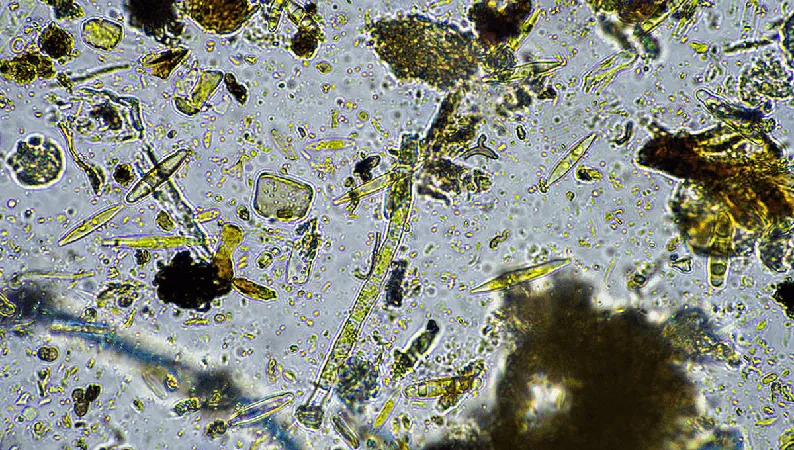
Groundbreaking Study Uncovers Over 300 New Genetic Risk Factors for Depression!
2025-01-14
Author: Daniel
Introduction
A monumental global study has revealed an astonishing 300 previously unidentified genetic risk factors for depression, thanks to the inclusion of a far more diverse population sample than past research endeavors.
Global Context and Statistics
According to the World Health Organization, approximately 280 million people, or 3.8% of the global population, experience depression at any given time. While various factors including life experiences, physical health issues, and stress contribute to the onset of depression, genetics play a significant role as well.
Research Methodology
An international team of researchers, spearheaded by experts from the University of Edinburgh and King’s College London, analyzed anonymized genetic data from over 5 million individuals across 29 countries, with a noteworthy 25% of the participants representing non-European ancestries. This balanced representation is crucial, as prior genetic studies largely centered around predominantly white and affluent populations, overlooking a vast majority of the world's diversity.
Key Findings
Their findings, published in the esteemed journal Cell, revealed a total of 700 genetic variations associated with depression. Strikingly, nearly half of these variations had never before been linked to the disorder. These minor shifts in DNA were found to affect neurons in various brain regions, including those responsible for emotional regulation.
Diversity in Genetic Findings
The research specifically identified 100 previously unknown genetic differences through the inclusion of participants of African, East Asian, Hispanic, and South Asian descent. Although each individual genetic risk factor may have a small effect, those with several genetic variants may face significantly heightened risks.
Implications for Treatment
The researchers assert that these groundbreaking findings could enhance the ability to predict an individual’s risk for depression across different ethnic groups and pave the way for more tailored treatment options, potentially diminishing health disparities.
Examination of Medications
Out of the 308 genes identified as contributors to higher depression risk, the team examined over 1,600 medications to see if they influenced these genes. Besides traditional antidepressants, they discovered that drugs like Pregabalin—often prescribed for chronic pain—and Modafinil, used for narcolepsy, may also impact these genetic variations and thereby offer new avenues for depression treatment. However, further clinical studies are imperative to verify the efficacy of these medications in depression patients.
Expert Opinions
Professor Andrew McIntosh, one of the study's lead authors at the University of Edinburgh’s Centre for Clinical Brain Sciences, emphasized the enormous gaps in our understanding of clinical depression. He stated, “Increasing the scale and diversity of our studies is essential to gain insights that can lead to enhanced therapies and preventive measures for those most at risk.”
In response to these findings, Dr. David Crepaz-Keay, from the Mental Health Foundation, heralded the study’s diverse genetic examination as 'a significant step forward.' However, he cautioned against viewing genetic risk markers as definitive indicators for treatment, arguing that the prevention of depression must also address societal issues like poverty and racism that exert a much stronger influence on mental health.
Dr. Jana de Villiers from the Royal College of Psychiatrists echoed these sentiments, praising the comprehensive nature of the research and its potential to inform better treatment protocols as our understanding of genetic risk factors and mental illness evolves.
Conclusion
This pivotal study could revolutionize how we approach depression, shifting the focus toward more personalized and effective treatment strategies. With further research on the newly discovered risk factors and treatment options underway, the future looks promising for millions battling this debilitating condition. Stay tuned for more updates on this groundbreaking research!



 Brasil (PT)
Brasil (PT)
 Canada (EN)
Canada (EN)
 Chile (ES)
Chile (ES)
 Česko (CS)
Česko (CS)
 대한민국 (KO)
대한민국 (KO)
 España (ES)
España (ES)
 France (FR)
France (FR)
 Hong Kong (EN)
Hong Kong (EN)
 Italia (IT)
Italia (IT)
 日本 (JA)
日本 (JA)
 Magyarország (HU)
Magyarország (HU)
 Norge (NO)
Norge (NO)
 Polska (PL)
Polska (PL)
 Schweiz (DE)
Schweiz (DE)
 Singapore (EN)
Singapore (EN)
 Sverige (SV)
Sverige (SV)
 Suomi (FI)
Suomi (FI)
 Türkiye (TR)
Türkiye (TR)
 الإمارات العربية المتحدة (AR)
الإمارات العربية المتحدة (AR)